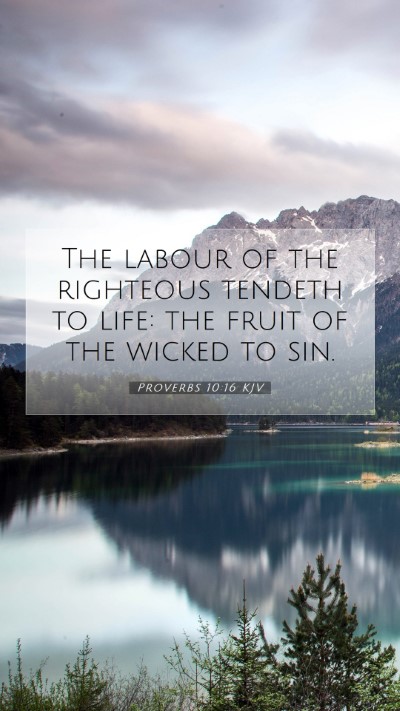Understanding Proverbs 10:16
Proverbs 10:16 states: "The labor of the righteous tends to life: the fruit of the wicked to sin." This verse presents a profound contrast between the outcomes of the righteous and the wicked. Below, we explore the meaning of this verse through various biblical commentaries to provide a thorough Bible verse commentary and Bible verse interpretation.
Insights from Public Domain Commentaries
Various theologians and biblical scholars offer their interpretations of this verse. Here are combined insights from Matthew Henry, Albert Barnes, and Adam Clarke:
Matthew Henry's Commentary
- The Righteous: According to Henry, the "labor of the righteous" refers to the diligent and virtuous efforts made by those who follow God's commandments. Their labor is not just about physical work, but a commitment to living a life in accordance with God’s will.
- Results of Righteousness: Henry emphasizes that such labor leads to "life," which he interprets not only as a long physical life but also as spiritual vitality and eternal life. This implies that living righteously cultivates a deeper relationship with God.
Albert Barnes' Commentary
- The Contrast: Barnes highlights the stark contrast between the outcomes of the righteous and the wicked. He points out that while the labor of the righteous yields positive and life-giving results, the actions of the wicked culminate in sin and spiritual death.
- Fruit of Labor: Barnes refers to “fruit” as the deeds or consequences of one’s life. A righteous person's efforts produce fruit that nourishes life, whereas the wicked's fruit is destructive.
Adam Clarke's Commentary
- Value of Work: Clarke elaborates on the concept of "labor," indicating that it signifies more than work; it embodies ethical living. This labor aligns with God's purpose and serves the broader community.
- Moral Implications: Clarke warns about the moral implications of wickedness, suggesting that sin leads not just to personal ruin but also casts a shadow on the social fabric, leading others astray.
Theological Reflection
This verse invites viewers to reflect on their own lives, prompting questions about the nature of their work and its outcomes. The significant contrast presented emphasizes not only individual accountability but also highlights the broader societal effects of our choices.
Practical Applications
For those engaged in Bible study lessons or online Bible study, Proverbs 10:16 serves as a foundation for discussions on:
- Applying Bible Verses to Daily Life: Consider how one's actions align with the teachings of Scripture.
- Understanding Difficult Bible Passages: Engage in discussions about righteousness and wickedness in contemporary contexts.
- In-depth Bible Verse Analysis: Further analyze how personal work ethic impacts one’s spiritual journey.
Related Bible Cross References
This verse connects deeply with other Scriptural selections, enhancing the understanding of righteous living:
- Galatians 6:7-8: "Whatever a man sows, that he will also reap." This reinforces the principle of consequences from our actions.
- Matthew 7:17: "Even so, every good tree bears good fruit, but a bad tree bears bad fruit." It aligns with the notion of fruitfulness in righteousness.
- James 1:15: "Then desire, when it has conceived, gives birth to sin; and sin when it is fully grown brings forth death." This complements the message regarding the outcomes of the wicked.
Conclusion
In conclusion, Proverbs 10:16 invites readers to consider the outcomes of their labors, the nature of their actions, and their alignment with God's ideals. Understanding such verses is crucial not just for personal edification but also for community impact within Bible study groups and beyond. By engaging with the insights of notable theologians and applying them to everyday situations, believers can cultivate a life that truly reflects the righteousness of God.


